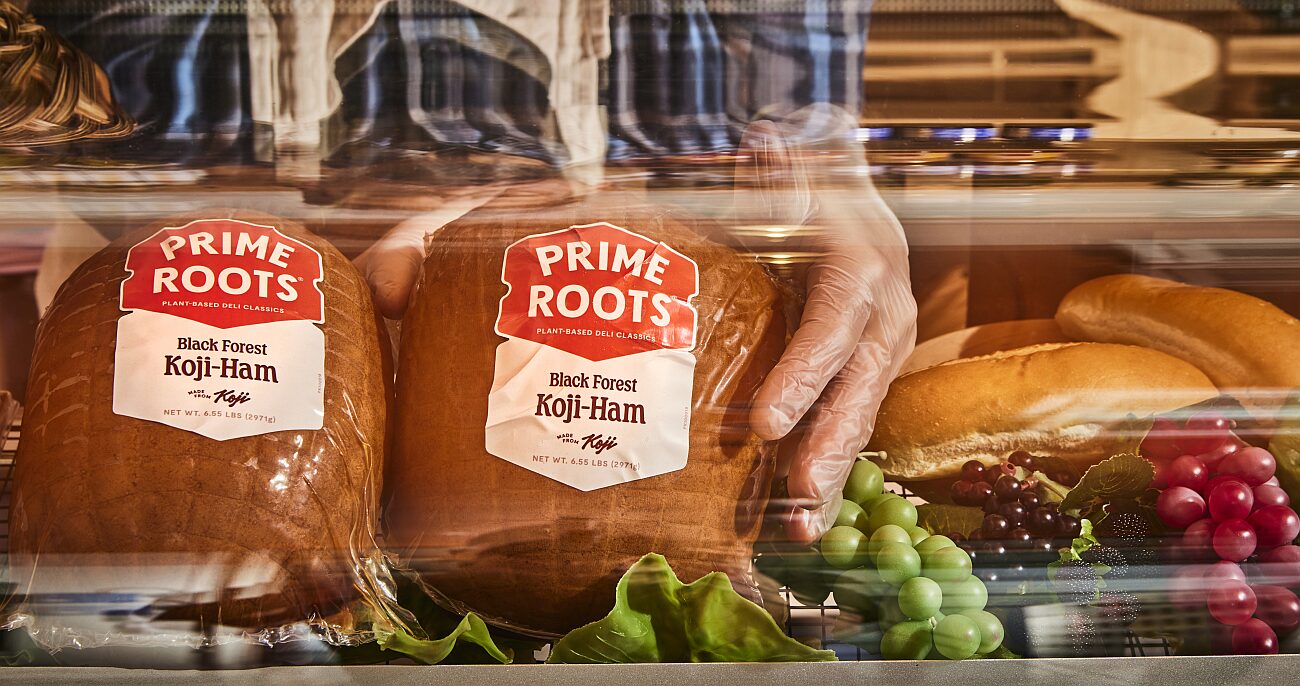
By Agroempresario.com
Agroempresario.com reports that Prime Roots, the San Francisco-based alt-meat startup, is steadily gaining traction in the deli meat segment with its innovative koji-based products. Co-founded by Kimberlie Le and Joshua Nixon in 2017, the company is redefining plant-based proteins by focusing on deli counter offerings such as turkey, ham, and salami that can be sliced fresh on-site. Unlike traditional plant-based alternatives, which often compete directly with chicken or beef products in retail freezers, Prime Roots is creating a new category aimed at consumers seeking less-processed, whole-food protein alternatives.
Kimberlie Le emphasizes that the company has found a unique market opportunity. “Deli meats are generally considered more processed than whole cuts of chicken or beef, which makes it easier for consumers to explore alternatives. We’re presenting a clean, whole-food source of protein without the nitrates or additives that often concern families,” she says. This strategic focus has allowed Prime Roots to compete effectively in a premium-priced section of grocery stores, appealing to consumers looking for both taste and nutritional value.
The company’s products are made using Aspergillus Oryzae, commonly known as Koji, a fungus-based mycelium that efficiently converts carbon and nitrogen into protein. Unlike other plant-based products that require protein extraction and extrusion, Prime Roots’ mycelium-based approach is less processed, providing a texture and flavor profile that closely resembles traditional deli meats. The company’s roots in UC Berkeley’s inaugural Alt:Meat lab gave them the foundation to explore sustainable protein sources without compromising quality or consumer expectations.

Unlike other high-profile alt-meat companies like Meati or The Better Meat Co, which pursued aggressive scaling through submerged fermentation and extensive fundraising, Prime Roots has taken a measured approach. Kimberlie Le explains, “We are unit profitable, and our focus has been on sustainable growth rather than rapid expansion. We want to ensure our production processes are scalable and that our products meet consumer expectations before taking on additional financial risk.”
The company initially launched in Bay Area supermarkets, conducting extensive consumer testing to refine both product and messaging. Prime Roots discovered early on that terms like “koji” or “mycelium” can be confusing to shoppers. Instead, descriptive product names like “cracked pepper ham-inspired” resonate better with consumers. Labels clearly outline ingredients for those who wish to understand the science behind the products, but the company avoids terms that could cause legal complications, such as “mushroom roots,” which has caused issues for other brands in the past.
Prime Roots’ strategic choice to focus on the deli counter rather than frozen burger patties or nuggets has been key to its growth. “We wanted to avoid direct competition with ubiquitous plant-based burgers and nuggets. By positioning ourselves in the deli section, we can command premium pricing and offer products that retailers are excited to feature,” says Le. Early results confirm that the strategy is working, with steady sales growth across current markets and plans to expand into new territories.
Manufacturing mycelium-based products is complex, but Prime Roots has built a strong operations team capable of scaling production. Le notes, “We’ve had a few years to figure out the scaling. Mycelium isn’t the cheapest source of protein, but our focus is on creating products that consumers genuinely want to buy. The flexibility of mycelium means we can create a wide variety of textures and flavors while maintaining high nutritional value.”
During the pandemic, the company leveraged that period to conduct consumer testing and refine product offerings. Since launching into retail deli counters three years ago, Prime Roots has expanded distribution across the West Coast, including partnerships with grocery chains and foodservice providers. The next step is national expansion, which the company anticipates achieving sometime in 2026.

One challenge the company faces is managing dual channels—retail and foodservice—simultaneously. “It’s not just about having a great product; it’s about delivering it to retailers and foodservice outlets effectively. That’s often more difficult than creating the product itself,” Le explains. The company’s careful approach has allowed it to scale efficiently, using the $50+ million raised to grow operations, not just marketing or hype.
Prime Roots also emphasizes transparency in communicating the benefits of mycelium-based proteins. While some consumers are unfamiliar with Koji, educational marketing helps bridge the knowledge gap. The company name itself, Prime Roots, conveys both the natural origin of the protein and the foundational role mycelium plays in sustainable food systems.
Industry analysts note that Prime Roots’ approach offers a blueprint for alt-meat companies seeking sustainable growth. By focusing on a niche within the deli counter, the company avoids direct competition with heavily capitalized players in the burger segment while establishing a loyal customer base. Kimberlie Le’s emphasis on unit profitability and slow, steady scaling has allowed Prime Roots to weather challenges that have slowed other startups in the space.
Prime Roots’ growth trajectory aligns with broader trends in consumer preferences. Shoppers increasingly prioritize health-conscious, minimally processed foods. The deli meat segment, traditionally dominated by processed options, represents a significant opportunity for plant-based alternatives. By positioning products as whole-food, fresh, and ready-to-slice, Prime Roots differentiates itself from competitors and offers an accessible entry point for new consumers to try plant-based proteins.
Looking forward, the company plans to expand its product lineup while maintaining quality and operational control. “Our goal is to create a brand that consumers trust for both flavor and nutritional value. Expansion is on the horizon, but we will continue to be deliberate about where and how we grow,” says Le. The focus remains on creating products that are not only sustainable but also desirable for everyday consumption, from family meals to foodservice offerings in restaurants and delis.
Prime Roots’ journey demonstrates that alt-meat companies can succeed without relying solely on massive fundraising or aggressive scaling. Strategic market placement, careful operational planning, and consumer-focused messaging have positioned the company as a growing player in the alternative protein sector. By leveraging the unique properties of mycelium, the company is able to produce innovative deli meats that meet rising consumer demand for healthier, less-processed protein options.
As Kimberlie Le notes, “We’ve been measured, thoughtful, and focused on creating products people genuinely enjoy. That approach is paying off, and we’re excited to expand nationally in the coming years.”
